Last updated on January 29th, 2024 at 04:28 pm

Are Dolphins Evil? Dolphins are not evil, but intelligent and social marine creatures known for their playful nature.
So, have you ever wondered about dolphins? You know, those super smart and playful marine creatures?
They’re like the celebrities of the sea, right? But here’s the thing: some folks have this wild idea that dolphins might be, wait for it, evil.
Can you believe that? I mean, they’re always smiling and doing flips, so how could they be evil, right? Well, let’s dive into the deep end and figure this out together.
We’ll chat about their behavior, their vibe with humans, and all the crazy myths that have people thinking they’re some sort of underwater villains. Get ready for a wild ride into the world of dolphins!
Table of Contents
Understanding Dolphins
Dolphins have always piqued people’s curiosity and imagination. They are remarkable species because of their playful, inquisitive temperament and their amazing underwater gymnastics.
Deciphering dolphin behavior and providing an answer to the question “Are dolphins evil?” require an understanding of dolphins. We shall examine their physiology, behavior, and social organization in this section.
See Also: Are Female Dolphins Evil? Unveiling the Truth
Physiology And Behavior
Dolphins are able to survive in their oceanic habitat due to their streamlined bodies and special adaptations.
With their slender bodies and flippers and dorsal fin, they can glide through the water with ease. Their highly developed echolocation system enhances these physical traits.
One amazing ability that dolphins and many other marine creatures possess is echolocation.
Dolphins are able to make an intricate acoustic map of their environment by clicking repeatedly and listening to the echoes.
They can explore, find prey, and communicate with each other more easily thanks to this capacity.
The respiratory system of dolphins is another amazing feature of their physiology.
As mammals, dolphins require oxygen to breathe, just like humans do. Dolphins, on the other hand, must consciously choose when to surface and breathe, unlike the majority of other mammals.
This activity is frequently observed when dolphins breach, or gracefully jump out of the water. This allows the dolphins to play and communicate while also replenishing their oxygen supply. [Are Dolphins Evil?]

Social Structure
Dolphins are gregarious animals with intricate social structures. They inhabit what are known as pods, which can include anywhere from a few to hundreds of people.
Dolphins in these pods participate in complex social behaviors such as group hunting, childrearing, and vocalizations for communication.
The close ties and mutual dependence among dolphins are among their most remarkable social structures. Dolphins’ protective and nurturing behaviors toward their young are especially indicative of this link.
For example, female dolphins tend to their calves in a caring manner, with other pod members helping to raise them.
Dolphins are also renowned for their intelligence and capacity for problem-solving. According to studies, dolphins have a remarkable capacity for memory and learning, which helps them quickly adjust to new situations.
Their advanced social behavior is further highlighted by their ability to cooperate and work together to solve tasks.
In conclusion, debunking the idea that dolphins are innately bad requires an understanding of them. Their social structure shows how highly evolved and cooperative they are, while their physiology and behavior reveal their adaption to the marine environment.
We may develop a greater respect for these amazing animals and a closer bond with the sea environment they live in by learning more about the world of dolphins. [Are Dolphins Evil?]
See Also: Why Are Male Dolphins Evil? The Dark Side of Dolphin Behavior
Signs Of Dark Behavior
It’s no secret that people have always been enthralled with dolphins due to their playfulness, intelligence, and agility.
But many are blind to the evil side lurking beneath their endearing façade. This blog article will discuss dolphins’ aggressive inclinations, infanticide, and sexual violence as well as the warning indications of dark behavior.
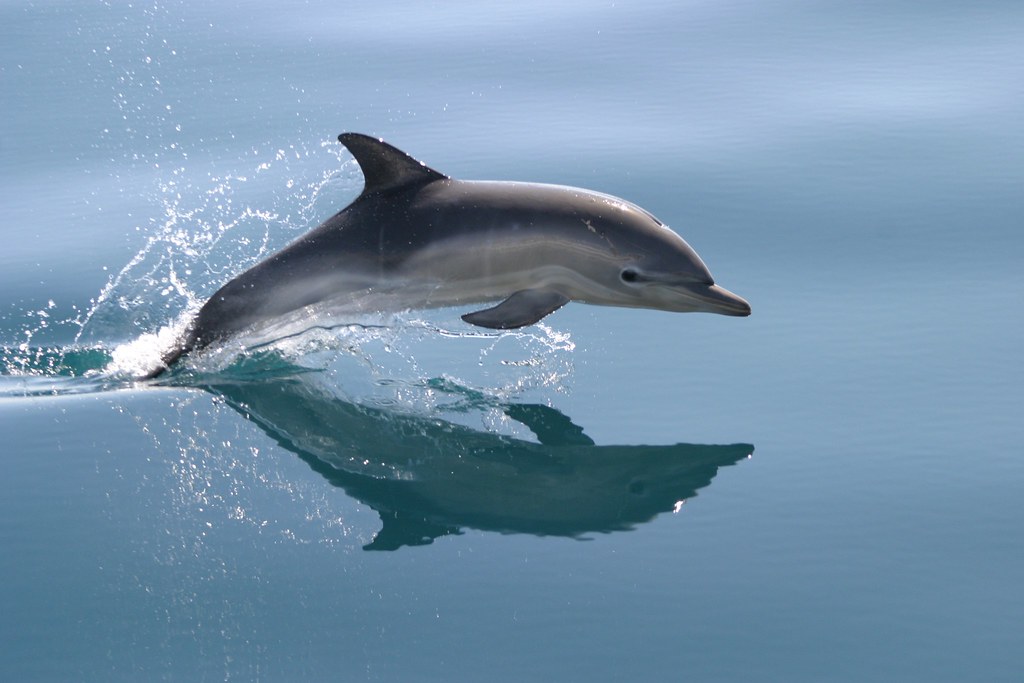
Violence Within Pod
Violence within Pod: Dolphins are renowned for having close-knit pods and strong social ties that mimic human families. However, violent incidents among these pods have been reported, casting doubt on the notion of dolphins as kind animals.
- Dolphins that are aggressive toward other members of their pod frequently bite, headbutt, and tail-slap one another. These actions may result in fatalities as well as severe injuries.
- One of the main things that set off violence in dolphin pods is competition for resources, such as food and mates. Violent interactions are how the group establishes its hierarchy and domination.
- Male dolphins are more prone to act violently, particularly when mating season arrives and rivalries over possible mates heat up. [Are Dolphins Evil?]
Infanticide
Infanticide: Dolphins who exhibit dark behavior tend to be very violent against their young. This behavior illuminates the intricate dynamics within dolphin groups, despite the fact that it may appear at odds with their nurturing disposition.
In order to obtain an advantage over their rival males in reproduction, male dolphins in particular have been seen to murder their rivals’ calves.
These male dolphins boost their own chances of passing on their genes by removing rivalry for mating opportunities.
Dolphins engage in a calculated and vicious practice known as infanticide, which frequently involves physically abusing or drowning the defenseless young. [Are Dolphins Evil?]
See Also: How Are Dolphins Evil? The Dark Side of These Sea Creatures
Sexual Aggression
Sexual Aggression: Although dolphins’ sexual behavior is typically viewed as amusing and agreeable, there are times when it takes a darker turn and exposes latent aggressiveness.
- Male dolphins have been known to exhibit sexual hostility toward other males as well as females, which frequently results in violent altercations and injuries.
- Male dolphins display their dominance during mating season by chasing females with force, which can occasionally result in the female’s injuries or death.
- Female dolphins can also act aggressively toward males that they do not want to mate with, proving that they are not immune to sexual aggression.
Dolphins’ Predatory Nature and Cruelty
Dolphins, often revered for their intelligence and playfulness, also exhibit a predatory nature that extends beyond mere survival.
Their hunting strategies are highly coordinated, displaying a ruthless efficiency in capturing prey. However, what sets dolphins apart is their tendency to engage in acts of cruelty towards other animals.
They have been observed playing with their prey before ultimately killing it, suggesting a level of enjoyment in inflicting harm.
This behavior challenges the notion of dolphins as benevolent beings and underscores the complexity of their behavior.
Understanding these predatory tendencies is crucial for fostering responsible interactions and conservation efforts in their marine habitats.
In conclusion, despite their reputation for being kind and fun, dolphins sometimes exhibit dark behaviors that should not be disregarded.
Dolphins who display violent behavior within their pods, infanticide, and sexual violence are indications that they have dark tendencies.
Gaining a thorough grasp of these intriguing aquatic organisms requires an understanding of their characteristics. [Are Dolphins Evil?]
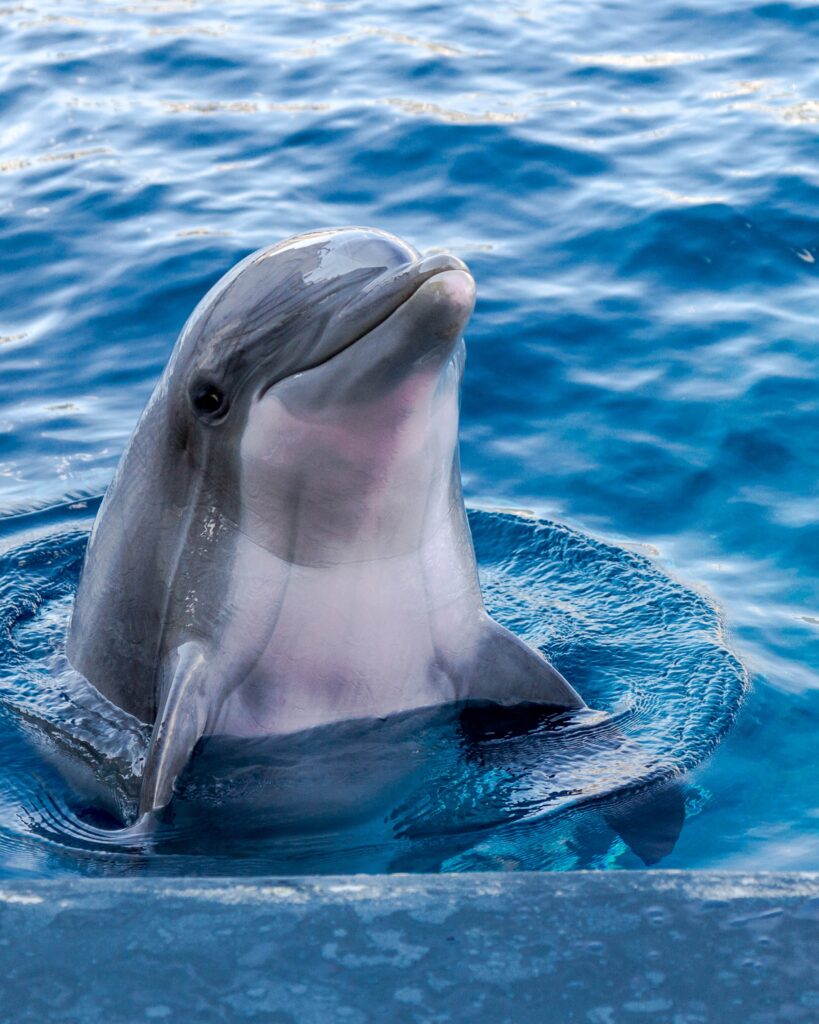
Theories On Dolphin Aggression
One of the most hotly debated subjects among scientists and nature enthusiasts is whether dolphins are truly good creatures or if they have a darker side.
Although dolphins are frequently praised for being kind and intelligent creatures, there have been well-documented cases of hostility, which has led academics to investigate a number of theories in an attempt to explain this behavior.
Let’s examine three important viewpoints that provide insight into the causes of dolphin hostility. [Are Dolphins Evil?]
See Also: Why Are Dolphins Evil To Humans? Unraveling the Darkness
Evolutionary Perspectives
According to some ideas, dolphin aggression may have its origins in survival instincts that have evolved over millions of years, from an evolutionary perspective.
Being social creatures, dolphins place a strong emphasis on authority and hierarchy within their pod. This implies that violent acts have the potential to create and uphold social order.
Competition over resources, like food or mates, or even a means of defending their pod from any dangers, may be the cause of aggressive behavior.
Despite their potentially aggressive appearance, these actions are crucial to the intricate social dynamics of dolphin populations. [Are Dolphins Evil?]
Environmental Factors
Dolphin behavior can also be influenced by their living environment. Stress levels can rise when environmental factors like pollution, climate change, and habitat loss interfere with their natural cycles.
Similar to people, dolphins’ behavior can be impacted by stress and may even turn aggressive. Chemical contaminants found in water, for example, can disrupt hormonal balances and lead to abnormal behavior.
Dolphin colonies may become more aggressive as a result of greater competition brought on by altered food sources brought on by overfishing or environmental deterioration.
See Also: Are Dolphins More Evil Than Sharks? The Truth Revealed!
Interactions With Humans
The effect of human interactions on dolphin aggression is an important factor to take into account.
Although they are typically depicted as kind animals, dolphins have been known to act aggressively toward people. There are various reasons why this hostility may occur.
Aggression can occasionally rise as a result of stress brought on by human activity, such as heavy boat traffic or marine park imprisonment.
Furthermore, feeding experiences with people have been shown to modify eating habits and create dependency in the dolphins, which may escalate into anger if these interactions are broken.
In order to encourage appropriate and ethical interactions between humans and these amazing marine animals, it is imperative that we comprehend how our activities affect dolphin behavior.
In summary, beliefs about dolphin aggression shed important light on the complexity of these sentient beings.
Examining evolutionary viewpoints, environmental elements, and human interactions aids in our understanding of why aggressiveness is seen in dolphin groups.
Enhancing conservation efforts and promoting a peaceful coexistence between people and dolphins can be achieved by continuing to study and appreciate these animals in their natural environments. [Are Dolphins Evil?]
Case Studies Of Infamous Dolphin Encounters
Learn about fascinating case studies of controversial interactions with dolphins that cast doubt on the idea that they are innocent.
These tales explore the issue, “Are dolphins really evil?” while revealing their complicated character. Let’s discover the real reason behind their behavior.
See Also: What Is The Evil Hidden Meaning Of Dolphins? Secrets Unveiled
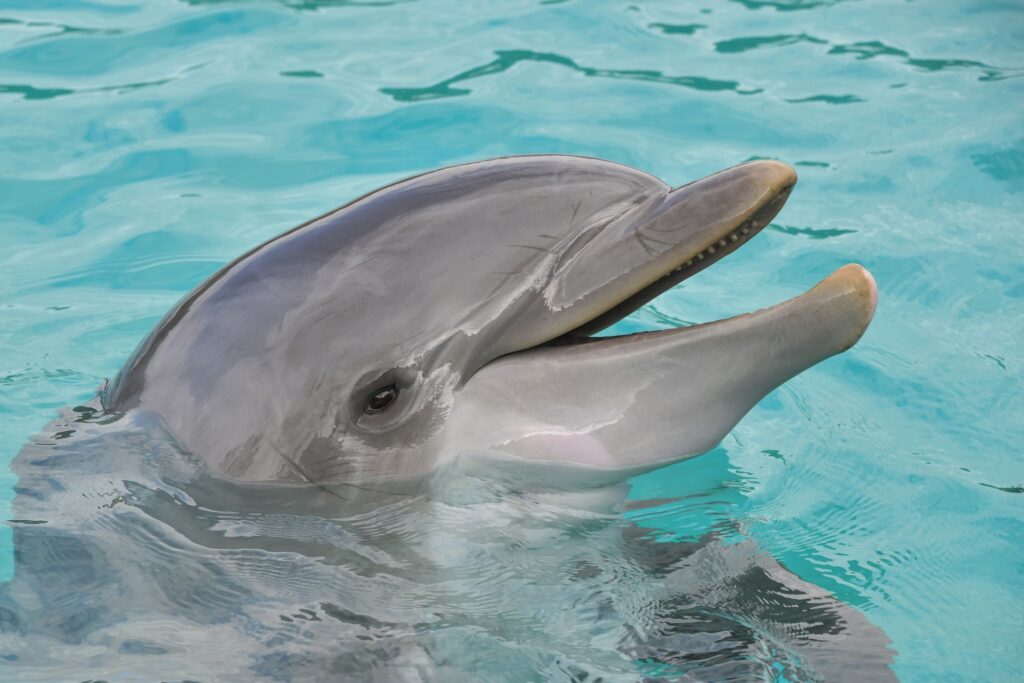
Captive Dolphins And Attacks On Trainers
One of the most well-known cases of dolphin aggression in captivity is the tragic incident involving trainer Dawn Brancheau at SeaWorld Orlando in 2010.
Brancheau had fostered a seemingly close relationship with Tilikum, the male orca, over the course of several years of labor. But Brancheau died when Tilikum pulled her underwater during a live performance by grabbing her ponytail.
This horrific event made people wonder about the nature of dolphin captivity and whether it could cause behavioral problems that show up as hostility toward people.
It’s crucial to avoid generalizing about all dolphins based on the conduct of a single individual, but this incident serves as a sobering reminder that even these lovable aquatic animals may display potentially harmful tendencies in specific situations.
In a different instance, over the course of several years, Kuru, a bottlenose dolphin kept as a captive in a Japanese aquarium, assaulted several trainers.
Kuru continued to be a serious safety risk even after attempts to curb his aggression via training and environmental enrichment were made.
Kuru’s actions ultimately resulted in the choice to move him to a new facility, underscoring the difficult tasks involved in overseeing and guaranteeing the security of dolphins kept in captivity. [Are Dolphins Evil?]
Although it is uncommon for dolphins to be aggressive toward humans in the wild, there have been reports of dolphins acting in ways that could be interpreted as threatening or aggressive.
One famous instance included a party of visitors who came upon a pod of dolphins off the coast of Ireland. At first, the interaction appeared friendly.
But when the tourists carried on interacting with the dolphins, the mood abruptly shifted. The dolphins started acting aggressively, jumping out of the water and smashing against the boat, among other things.
Luckily, no one was hurt, but the experience left the tourists unsettled and raised more questions about the possible dangers of getting too close to wild dolphins.
It’s crucial to keep in mind that these instances are often uncommon and take place under particular conditions.
Dolphins are widely seen as being amiable and playful, and their encounters with people in the wild are frequently serene and breathtaking.
To protect the safety of both people and dolphins, caution and respect are necessary as with any encounter with animals. [Are Dolphins Evil?]
See Also: What Do Dolphins Do That Is Evil? Aquatic Antics Unleashed
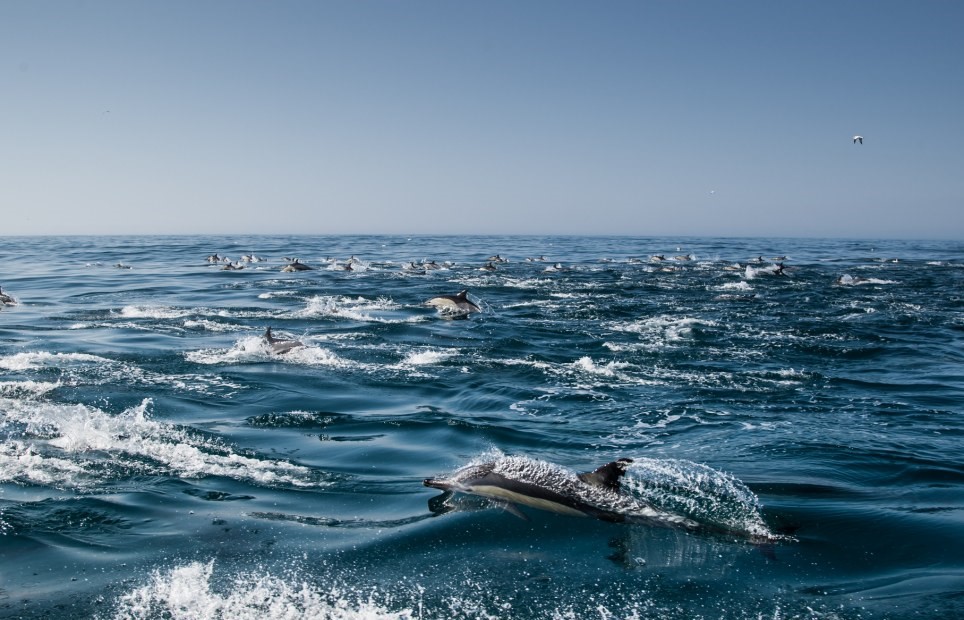
The Ethics Of Dolphin Captivity
The ethical discussion surrounding dolphin captivity is on the effects it has on these social and intellectual animals, as well as the implications for public safety.
Restricting dolphins to small tanks raises questions about their welfare and natural behaviors because dolphins are highly intelligent and sentient animals.
The impacts of dolphin confinement on behavior, possible hazards to human safety, and alternate strategies will all be discussed in this section. [Are Dolphins Evil?]
Effects On Dolphin Behavior
Dolphins’ behavior, which is influenced by their social structures and natural surroundings, is greatly altered by being kept in captivity.
Dolphins are extremely gregarious creatures that reside in close-knit pods and use sophisticated patterns of navigation, hunting, and communication. But dolphins who are kept in tiny tanks have a variety of behavioral abnormalities, including:
Hostility and Stress: Due to the confines of captivity, dolphins frequently exhibit higher levels of stress and hostility. Restrictions can lead to social hierarchies that do not represent their natural dynamics, as well as frustration and melancholy.
Abnormal Behaviors: Captive dolphins may display odd behaviors including self-mutilation, repetitive motions, and stereotyping as a way of adjusting to their foreign surroundings. These actions are unmistakable signs of psychological anguish.
Decreased Social Interaction: When kept in captivity, dolphins are frequently split off from their native pods and housed with strangers. Their social links are broken, which reduces their chances of interacting with others and engaging in cooperative activities. [Are Dolphins Evil?]
Impact On Human Safety
While dolphins are generally perceived as gentle and friendly creatures, captivity can have unforeseen consequences for human safety:
Aggressive Behavior: Being in confinement can cause stress and frustration, which can exacerbate an animal’s anger against people. The possible risks are highlighted by the instances in which trainers or guests have been attacked by or harmed by captive dolphins.
Loss of Natural dread: Dolphins in the wild still have a healthy dread of people, which keeps everyone safe. In captivity, though, they get habituated to human presence and may lose their innate apprehension. This may put them in a position where they could endanger people who aren’t paying attention.
Unpredictability: Dolphins in captivity may exhibit unpredictable behavior due to their small living space. It might be challenging to correctly predict their activities because of the ways in which their innate instincts and skills can be suppressed or changed. [Are Dolphins Evil?]
See Also: 10 Reasons Why Dolphins Are Evil? Expose Their Evil Nature
Alternatives To Captivity
Recognizing the ethical concerns surrounding dolphin captivity, several alternatives have been proposed to promote the welfare of these intelligent creatures:
Sanctuaries: Creating sizable, realistic sanctuaries gives dolphins more room, fosters social relationships, and allows them to behave in their native ways. It produces a setting that is more like their natural habitat—a semi-wild one.
Research and Conservation: Rather than keeping dolphins in captivity, efforts should be directed toward observing dolphins in their natural habitats, where important information on their ecology, behavior, and conservation requirements can be gathered.
In addition to raising awareness, this strategy helps to safeguard and maintain wild dolphin populations. [Are Dolphins Evil?]
Educational Outreach: Promoting education through activities like as engaging, non-intrusive dolphin encounters in the wild and whale watching provides a moral means for people to understand and get a sense of these amazing animals.

Challenging The ‘evil’ Label
“Are dolphins evil?” The general public, scientists, and animal lovers have all had heated conversations and fights about this issue.
Although their intelligence, playful attitude, and relationships with humans have long been revered, some people express concern about the darker side of dolphins.
Nonetheless, it’s critical to address this subject objectively and refrain from prematurely categorizing dolphins as reptiles. [Are Dolphins Evil?]
Balanced Perspectives
It’s important to examine dolphin behavior from a thorough and balanced perspective before delving into the question of whether or not they are wicked.
Like all other living things, dolphins display a variety of behaviors that defy easy categorization as good or bad.
Their behavior is frequently influenced by social dynamics, environmental factors, and survival instincts.
Although there have been reports of violent or damaging incidences with dolphins, it’s important to keep in mind that these occurrences are not common.
Dolphins may behave aggressively in response to threats or in an attempt to establish dominance within their social groupings, much as some humans may do in similar situations.
It is important to recognize that isolated incidents of hostility do not characterize their entire species, though, and to refrain from drawing broad conclusions. [Are Dolphins Evil?]
Highlighting Positive Behavior
It’s critical to draw attention to the good conduct dolphins display in order to refute the negative connotations attached to them.
Dolphins are renowned for their intricate communication systems and tight relationships, making them extremely social animals.
They frequently act philanthropically, lending a hand to hurt or disturbed pod members. Dolphins are caring creatures; there are several stories of their saving stranded swimmers or shielding humans from harm. [Are Dolphins Evil?]
Dolphins are also well known for their intelligence and capacity for problem-solving. They exhibit amazing skills including using tools, imitating, and even having self-awareness.
These characteristics reveal their ability for empathy and cooperative behavior in addition to showcasing their intelligence.
Moreover, dolphins are essential to preserving the biological equilibrium of marine habitats since they are keystone species.
Their existence benefits many other species as well as the ecosystem as a whole by enhancing the biodiversity and health of our waters.
In conclusion, even if dolphins occasionally display violent behavior, it’s critical to address the claims made about their purported “evilness” from a fair and impartial standpoint.
It will be easier to comprehend these fascinating creatures if we emphasize their good traits and comprehend the variables that could affect their behavior.
For the benefit of our waters and the organisms that live there, we must recognize and preserve dolphins’ remarkable traits rather than categorizing them as essentially bad. [Are Dolphins Evil?]
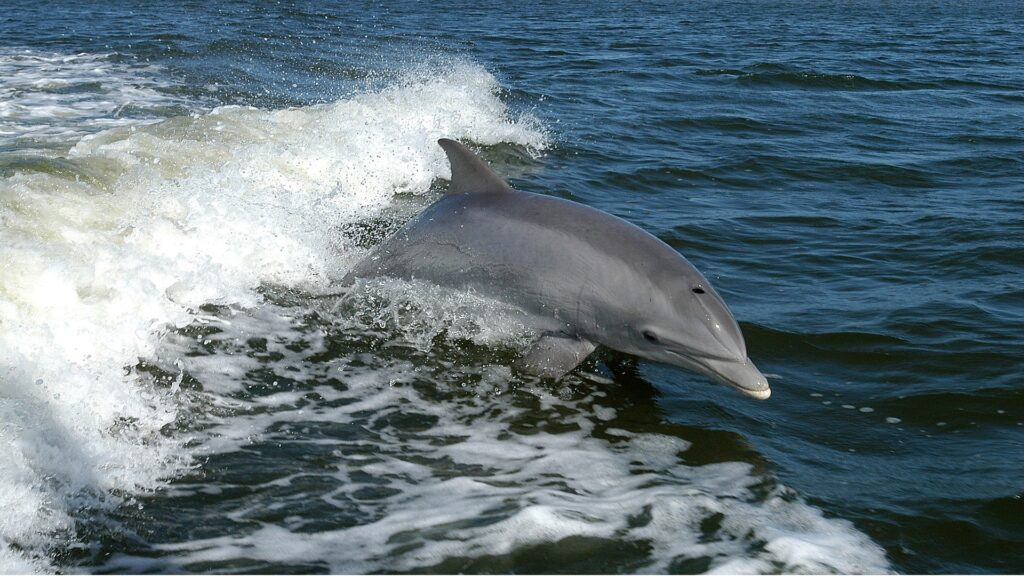
Frequently Asked Questions Of Are Dolphins Evil?
Do Dolphins Have A Dark Side?
Yes, there is a dark side to dolphins. Despite their reputation for brilliance and good humor, they are also capable of aggressive conduct and violent interactions. These more sinister actions consist of sexual coercion, infanticide, and bullying. It’s crucial to keep in mind that, like other animals, dolphins exhibit a wide variety of behaviors.
Are Dolphins Friendly Or Evil?
Dolphins are energetic and generally amiable animals that enjoy interacting with people. They are not viewed as wicked. Dolphins are popular subjects for therapeutic programs and marine conservation projects because of their empathy and interest in people.
Do Dolphins Respect Humans?
Although respect is a subjective and varied trait, dolphins often exhibit interest and friendliness towards people. Although their connections might be beneficial, it’s crucial to keep in mind that dolphins are wild creatures. [Are Dolphins Evil?]
Why Are Sharks Afraid Of Dolphins?
Although dolphins are not inherently dangerous to sharks, sharks may exercise caution when nearing them due to the fact that dolphins are very intelligent and fast swimmers, which may position them as rivals or competitors for resources.
Conclusion
Debatable issues include whether or not dolphins are malevolent. Interesting questions are raised by their social behavior, intelligence, and occasional aggressiveness toward people.
Even while they have a complicated nature, it’s vital to keep in mind that it would be oversimplifying to categorize them as exclusively good or evil.
Further research and understanding are crucial in unraveling the mysteries of these fascinating creatures.

Mr. Das, a certified pharmaceutical scientist, holds a Bachelor of Science in Pharmaceutical Sciences and passionately contributes to dolphin conservation as a member of the committee in Bangladesh.


